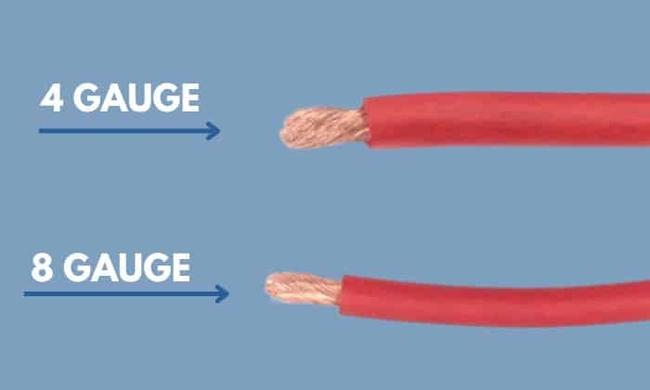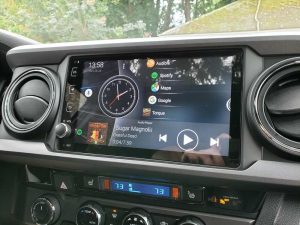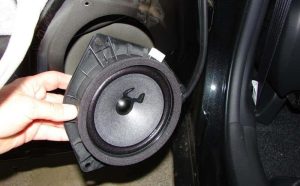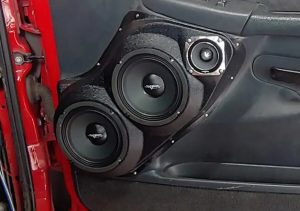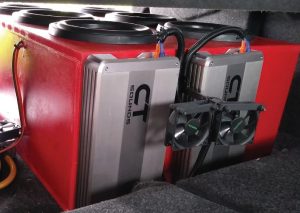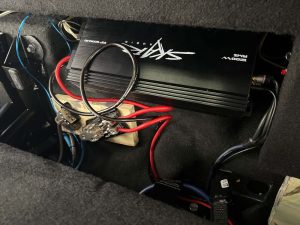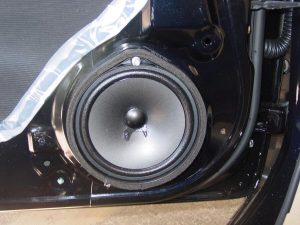Selecting the right wire gauge for your car audio system sparks a lot of debate among enthusiasts. The choice between 4-gauge and 8-gauge wire directly impacts your system’s performance, safety, and efficiency. This guide dives deep into the differences between these two wire sizes, helping you make an informed decision tailored to your setup. Whether you’re upgrading your car stereo or building a high-powered audio system, understanding wire gauge ensures your investment delivers booming sound without compromising safety.
Contents
- What Is Wire Gauge, and Why Does It Matter?
- Understanding 4-Gauge Wire
- Exploring 8-Gauge Wire
- Key Differences Between 4-Gauge and 8-Gauge Wire
- When to Choose 4-Gauge Wire
- When to Choose 8-Gauge Wire
- Factors to Consider When Choosing Wire Gauge
- Common Mistakes to Avoid
- How to Install Your Car Audio Wiring
- Copper vs. CCA: Which Is Better?
- FAQs About 4-Gauge and 8-Gauge Wire
- Conclusion
What Is Wire Gauge, and Why Does It Matter?
Wire gauge refers to the thickness of an electrical wire, measured by the American Wire Gauge (AWG) system. In this system, a smaller gauge number indicates a thicker wire. For example, a 4-gauge wire is thicker than an 8-gauge wire. The thickness of the wire determines how much electrical current it can safely carry without overheating or losing power.
In car audio systems, wires deliver power from the battery to amplifiers, speakers, and other components. Choosing the wrong gauge can lead to issues like voltage drops, overheating, or even fire hazards. By picking the right wire size, you ensure your system runs efficiently, delivering crisp, powerful sound while protecting your vehicle.
Understanding 4-Gauge Wire
A 4-gauge wire is a heavy-duty option designed for high-power car audio systems. Its thicker diameter allows it to handle large amounts of current, making it ideal for setups with powerful amplifiers or multiple subwoofers. Here’s a closer look at its key characteristics:
- Current Capacity: 4-gauge wire can carry up to 60-70 amps over short distances (under 10 feet), depending on the insulation and material.
- Applications: Perfect for systems with amplifiers rated at 1000 watts RMS or more, multiple amps, or large subwoofers.
- Material: Typically made of copper or copper-clad aluminum (CCA). Pure copper offers better conductivity, while CCA is more affordable but less efficient.
- Flexibility: Thicker wires like 4-gauge are less flexible, which can make installation trickier in tight spaces.
This wire shines in high-performance setups where power demands are significant. For instance, if you’re running a competition-level audio system with multiple amplifiers, a 4-gauge wire ensures consistent power delivery without straining your system.
Exploring 8-Gauge Wire
An 8-gauge wire is thinner and more flexible than its 4-gauge counterpart, making it a popular choice for smaller or moderate car audio setups. Let’s break down its features:
- Current Capacity: Handles around 25-35 amps over short runs, suitable for less demanding systems.
- Applications: Works well for amplifiers rated up to 400-600 watts RMS, single subwoofer setups, or basic aftermarket stereo upgrades.
- Material: Like 4-gauge, it’s available in copper or CCA. Copper provides superior performance, but CCA keeps costs down.
- Flexibility: Its smaller size makes it easier to route through tight spaces, simplifying installation.
For casual listeners or those upgrading a factory stereo, an 8-gauge wire often meets the power needs without overcomplicating the setup. It’s a go-to for budget-conscious builds or systems with moderate power requirements.
Key Differences Between 4-Gauge and 8-Gauge Wire
To choose the right wire, you need to understand how 4-gauge and 8-gauge wires stack up. Here’s a detailed comparison:
1. Power Handling
4-gauge wire carries significantly more current than 8-gauge, making it suitable for high-wattage systems. If your amplifier demands 50 amps or more, 4-gauge is the safer bet. On the other hand, 8-gauge suffices for systems with lower amperage needs, typically under 35 amps.
2. Voltage Drop
Voltage drop occurs when a wire loses power over distance due to resistance. Thicker 4-gauge wire has lower resistance, reducing voltage drop in long runs or high-power setups. In contrast, 8-gauge wire may experience noticeable voltage loss in similar conditions, leading to reduced amplifier performance or distorted sound.
3. Installation Ease
8-gauge wire’s smaller size and greater flexibility make it easier to install, especially in compact vehicles or complex wiring routes. Conversely, 4-gauge wire’s bulkiness can pose challenges, requiring more planning to avoid sharp bends or cramped spaces.
4. Cost
Thicker wires like 4-gauge cost more due to the increased material used. Copper 4-gauge wire, in particular, can strain your budget. Meanwhile, 8-gauge wire, especially CCA versions, is more affordable, appealing to those building systems on a budget.
5. Safety
Using a wire gauge too small for your system’s power demands risks overheating, insulation melting, or even fires. 4-gauge wire’s higher capacity makes it safer for high-power applications, while 8-gauge suits less demanding setups without safety concerns.
When to Choose 4-Gauge Wire
Opt for 4-gauge wire if your car audio system falls into these categories:
- High-Power Amplifiers: Systems with amps rated at 1000 watts RMS or higher need the robust current capacity of 4-gauge wire.
- Multiple Components: If you’re running several amplifiers, subwoofers, or capacitors, 4-gauge wire handles the combined power demands.
- Long Wire Runs: For installations requiring wires longer than 10 feet, 4-gauge minimizes voltage drop, ensuring consistent performance.
- Competition Systems: Audio enthusiasts aiming for maximum sound quality and power output benefit from the reliability of 4-gauge wire.
For example, a setup with two 12-inch subwoofers and a 1500-watt amplifier demands a 4-gauge wire to deliver stable power without overheating.
When to Choose 8-Gauge Wire
An 8-gauge wire is the better choice for these scenarios:
- Moderate Systems: Amplifiers rated at 400-600 watts RMS or less pair well with 8-gauge wire.
- Single Amplifier Setups: If you’re powering a single amp for a basic subwoofer or speaker upgrade, 8-gauge is sufficient.
- Short Wire Runs: For compact vehicles or setups with wires under 10 feet, 8-gauge handles the load without significant voltage drop.
- Budget Builds: Those looking to save money without sacrificing performance often find 8-gauge wire meets their needs.
For instance, upgrading a factory stereo with a 300-watt amplifier and a single 10-inch subwoofer works perfectly with an 8-gauge wire.
Factors to Consider When Choosing Wire Gauge
Beyond the gauge itself, several factors influence your decision. Keep these in mind to ensure your system performs at its best:
1. Amplifier Power Requirements
Check your amplifier’s RMS wattage and fuse rating to estimate its current draw. Use this formula:
Current (Amps) = Power (Watts) ÷ Voltage (Volts)
For a 12-volt car system, a 600-watt amplifier draws about 50 amps (600 ÷ 12). A 4-gauge wire is necessary for this load, while a 300-watt amp (25 amps) works with 8-gauge.
2. Wire Length
Longer wires increase resistance, leading to voltage drop. For runs over 10 feet, lean toward 4-gauge to maintain efficiency. Shorter runs under 10 feet often work fine with 8-gauge for moderate systems.
3. Material Quality
Copper wires offer better conductivity than CCA, but they cost more. If you choose CCA to save money, ensure the wire gauge matches your system’s demands, as CCA requires a slightly thicker gauge for equivalent performance.
4. Installation Environment
Consider your vehicle’s layout. Tight spaces favor the flexibility of 8-gauge wire, while open areas accommodate the bulkier 4-gauge. Also, ensure wires are protected from heat, moisture, and sharp edges to prevent damage.
5. Future Upgrades
Plan for future system expansions. If you might add more amplifiers or subwoofers later, choosing 4-gauge now saves you from rewiring down the road.
Common Mistakes to Avoid
Picking the wrong wire gauge can sabotage your audio system. Steer clear of these pitfalls:
- Undersizing the Wire: Using 8-gauge for a high-power system risks overheating and performance issues. Always match the gauge to your system’s current demands.
- Ignoring Wire Length: Long runs with 8-gauge wire can lead to voltage drop, reducing sound quality. Opt for 4-gauge for extended distances.
- Skimping on Quality: Cheap, low-quality wires may not handle rated currents, leading to safety hazards. Invest in reputable brands with proper insulation.
- Improper Installation: Failing to secure wires or protect them from heat and abrasion can cause shorts or failures. Use looms, grommets, and proper grounding techniques.
How to Install Your Car Audio Wiring
Proper installation ensures your wire gauge performs as expected. Follow these steps for a safe, efficient setup:
- Plan Your Route: Map out the wire path from the battery to the amplifier, avoiding heat sources, moving parts, and sharp edges.
- Choose the Right Fuse: Install a fuse near the battery (within 12 inches) rated slightly higher than your system’s total current draw. For example, a 50-amp system needs a 60-amp fuse.
- Cut and Strip Wires: Measure the wire length, cut it, and strip the ends to expose the conductor. Use quality connectors for secure attachments.
- Route the Wire: Run the power wire through the firewall, using a grommet to protect it. Secure the wire with zip ties or looms to prevent movement.
- Ground the System: Connect the ground wire to a clean, unpainted metal surface near the amplifier. Keep the ground wire short (under 3 feet) to reduce resistance.
- Test the System: Before finalizing connections, test the system to ensure proper power delivery and no shorts.
Copper vs. CCA: Which Is Better?
Both 4-gauge and 8-gauge wires come in copper or CCA. Here’s how they compare:
- Copper: Offers superior conductivity, lower resistance, and better durability. It’s ideal for high-performance systems but costs more.
- CCA: More affordable, but less conductive, requiring a thicker gauge to match copper’s performance. Suitable for budget builds with moderate power needs.
For high-power systems using 4-gauge wire, copper is worth the investment for reliability. In 8-gauge applications for smaller setups, CCA often suffices if properly sized.
FAQs About 4-Gauge and 8-Gauge Wire
Can I use 8-gauge wire for a 1000-watt amplifier?
No, a 1000-watt amplifier typically draws 80-100 amps, exceeding the capacity of 8-gauge wire. Use 4-gauge or thicker for safety and performance.
Is 4-gauge wire overkill for a 500-watt system?
It depends on wire length and future plans. For short runs, 8-gauge may suffice, but 4-gauge is a safer choice for long runs or planned upgrades.
How do I know if my wire is overheating?
Signs include warm or discolored insulation, burning smells, or reduced system performance. If you notice these, stop using the system and check your wire gauge and connections.
Can I mix 4-gauge and 8-gauge wires in one system?
Avoid mixing gauges for power delivery, as the smaller wire may become a bottleneck, causing overheating or voltage drop. Use consistent gauging throughout.
Conclusion
Choosing between 4-gauge and 8-gauge wire boils down to your car audio system’s power needs, wire length, and budget. For high-power setups with large amplifiers or long runs, 4-gauge wire delivers the reliability and safety you need. For moderate systems or budget builds, 8-gauge wire offers a cost-effective, flexible solution. By considering your amplifier’s wattage, wire material, and installation environment, you can select the perfect gauge to power your sound system effectively.
Invest time in planning your wiring setup, prioritize quality materials, and follow proper installation practices. This ensures your car audio system pumps out crystal-clear sound while staying safe and efficient. Ready to upgrade your ride’s audio? Grab the right wire gauge and let your music roar.
